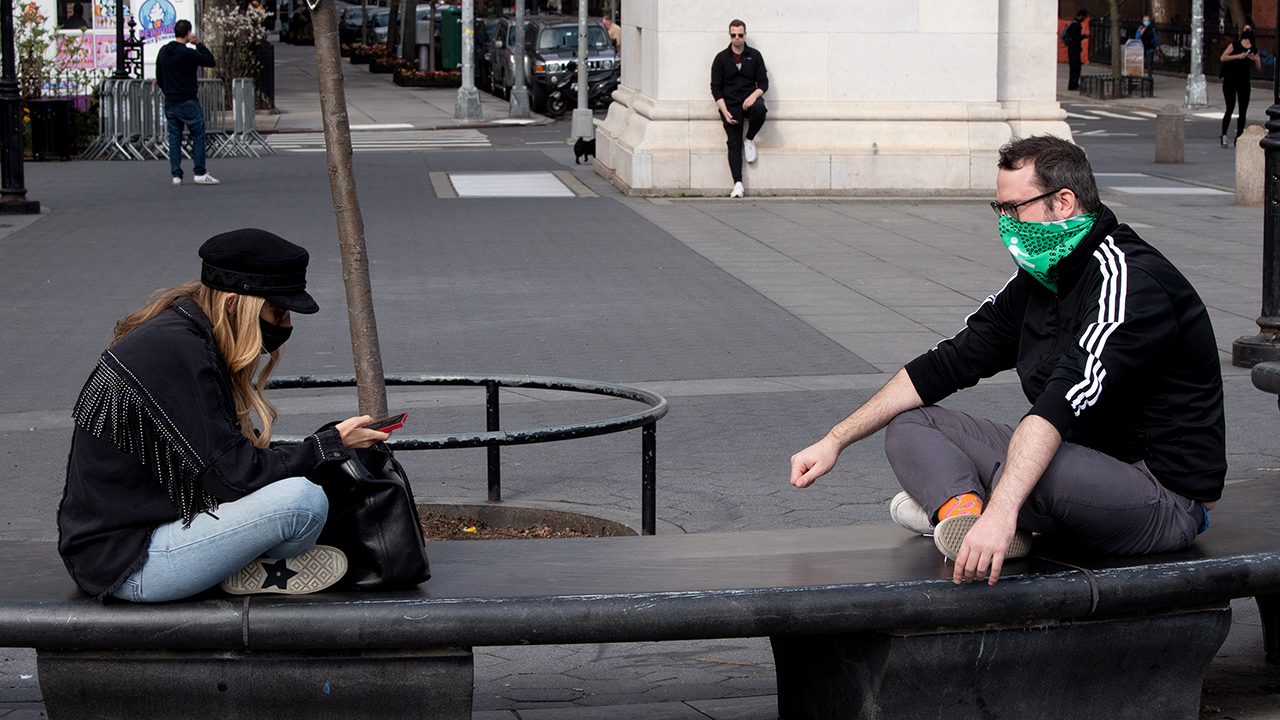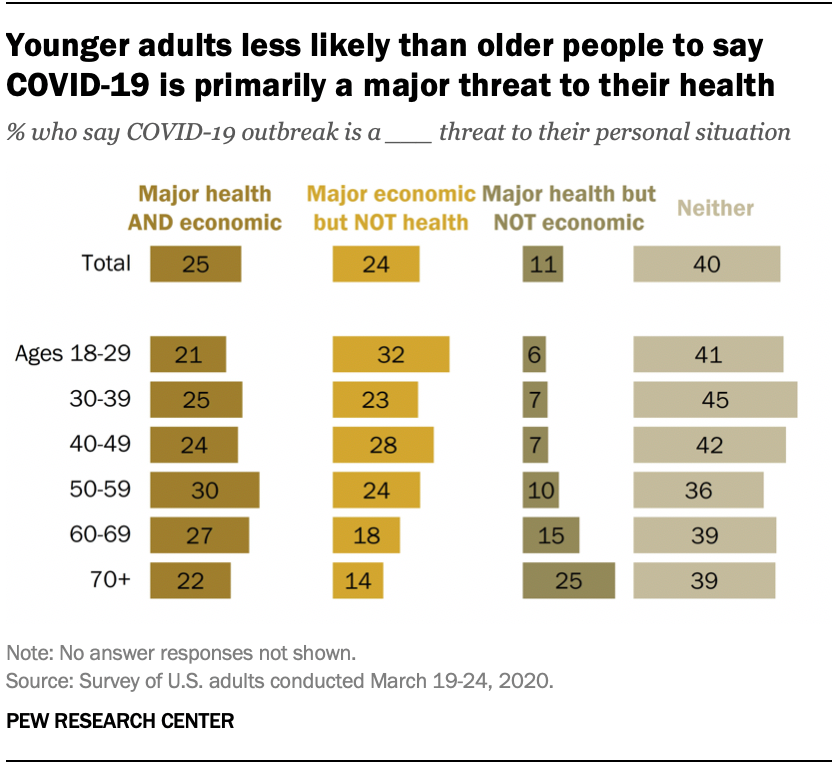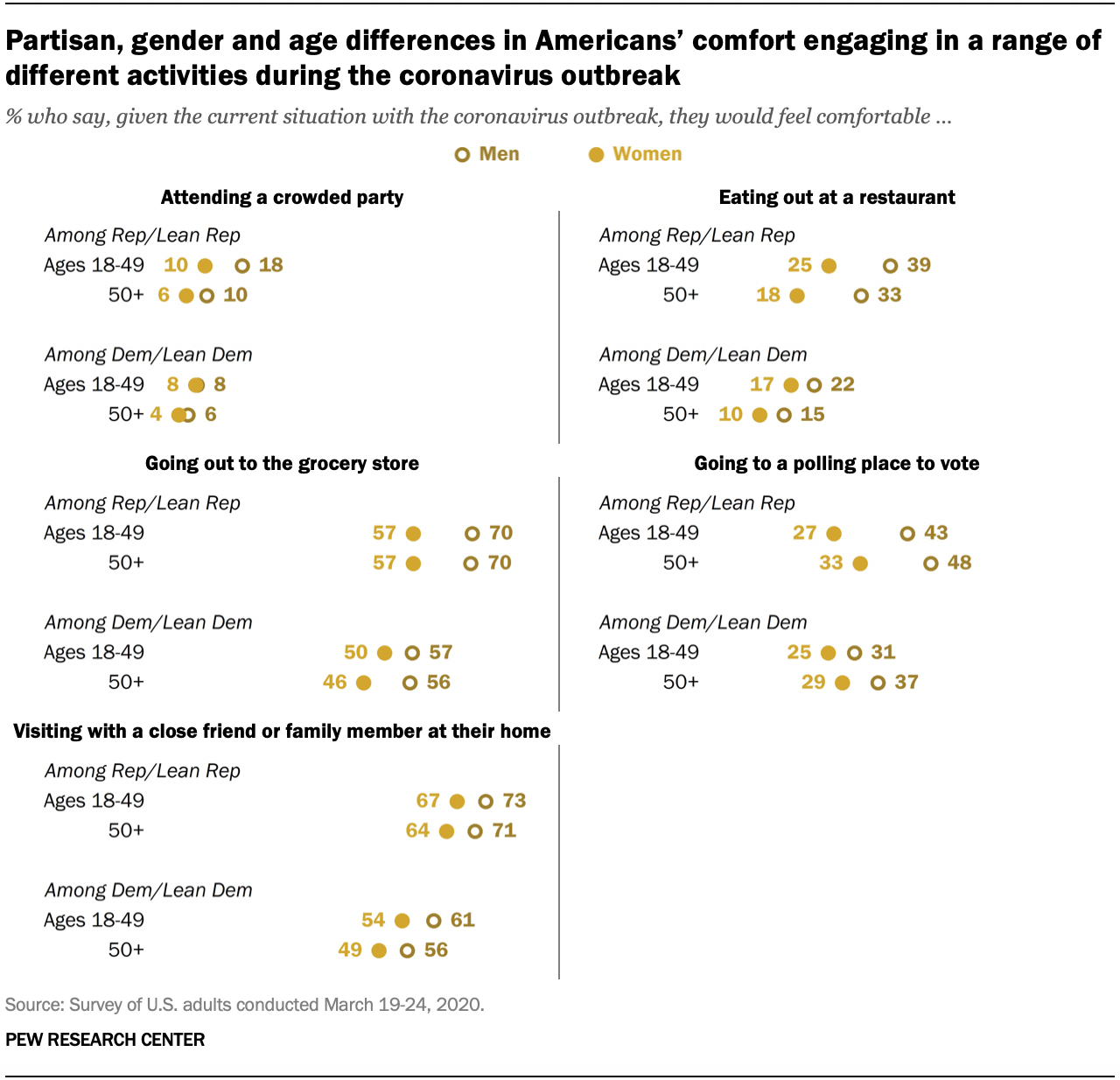

The coronavirus outbreak has impacted life for millions of Americans, but it has not affected people in the same way. Older Americans are more likely than younger adults to feel their own health is at risk, while younger people are more focused on potential economic threats.
Overall, larger shares of U.S. adults view the COVID-19 outbreak as a major threat to the nation’s economy (88%) and the health of the U.S. population as a whole (66%) than to their own finances (49%) and health (36%). Across each of these areas, concerns about the outbreak have increased significantly since mid-March.
The survey, conducted March 19-24, finds that a quarter of adults say the coronavirus outbreak is a major threat to their personal health and finances. About as many (24%) say it is a major threat to their finances, but not to their health. Fewer Americans (11%) view the outbreak as a major threat to their health, but not their finances. However, 40% say it is not a major threat either to their health or their finances.
How we did this
Pew Research Center conducted this study to understand how Americans are continuing to respond to the coronavirus outbreak. For this analysis, we surveyed 11,537 U.S. adults in March 2020. Everyone who took part is a member of the Center’s American Trends Panel (ATP), an online survey panel that is recruited through national, random sampling of residential addresses. This way nearly all U.S. adults have a chance of selection. The survey is weighted to be representative of the U.S. adult population by gender, race, ethnicity, partisan affiliation, education and other categories. Read more about the ATP’s methodology.
Here are the questions used for this report, along with responses, and its methodology.
Compared with older age groups, younger Americans are more likely to say that the COVID-19 outbreak is a major threat to their personal financial situation but not a major threat to their personal health.
Just 6% of those under age 30 say the coronavirus outbreak is a major threat to their personal health and not a major threat to their finances. By comparison, about a third (32%) say it is a major threat to their finances and not their health. Another 21% say it is a major threat to both their finances and health, while 41% do not view the outbreak as a major threat to either.
The pattern is similar among the next oldest age groups; significantly more people in their 30s through 50s say the coronavirus outbreak is a major threat to their finances and not their health than say the opposite.
But those 70 and older are about four times as likely as the youngest adults (those ages 18 to 29) to say the coronavirus outbreak is a major threat to their health but not their finances (25% vs. 6%).
Aside from age differences, there also are partisan differences in views of the threats from the coronavirus outbreak. Democrats and Democratic-leaning independents are more likely than Republicans and Republican leaners to say that the coronavirus outbreak is a major threat to both their personal health and their own financial situation. About three-in-ten Democrats (29%) say that COVID-19 is a major threat to their own health and their finances compared with 19% of Republicans who feel the same way. Nearly half of Republicans (47%) say it is not a major threat to either their personal financial situation or their own health; only about a third of Democrats (35%) say the same.
Views of social distancing activities differ by party, age
When it comes to how comfortable people feel with engaging in social activities during the coronavirus outbreak, the March 19-24 survey, fielded as many states were escalating their response to the outbreak, revealed differences by partisanship, gender and age. Republicans are significantly more likely than Democrats to say they would be comfortable engaging in several activities; for example, while 29% of Republicans and GOP leaners say they would be comfortable eating out in a restaurant, 16% of Democrats (including leaners) say the same.

Larger shares of Republican men than women say they would be comfortable eating in a restaurant, and this is the case among Republicans under age 50 as well as older Republicans. Gender differences are more modest among Democrats.
Looking at age differences among partisans, younger Republicans are particularly likely to express comfort with attending a crowded party. This is especially evident among younger, Republican men.
About one-in-five Republican men ages 18 to 49 (18%) say they would be comfortable attending a crowded party, which is larger than the shares of older Republicans – or Democrats in any age group – who say that.
Gender gaps are also seen across the set of activities asked about, with men substantially more likely than women to say they would feel comfortable taking part in a variety of activities during the outbreak.
Republicans and men expressed more willingness to engage in every activity included in the survey compared with Democrats and women. Even after accounting for differences in the kinds of places Republicans and Democrats live (for example, whether they live in an urban, rural or suburban place and how much their state had been impacted so far by the coronavirus outbreak) and other demographic differences associated with partisanship (age, race and ethnicity, education, and sex), partisan differences remain among the biggest divides in willingness to engage in all of the activities asked about.
Note: Here are the questions used for this report, along with responses, and its methodology.
